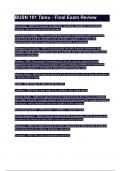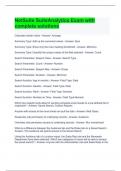Exam (elaborations)
BUSN 101 Tamu - Final Exam Review Questions with 100% Actual correct answers | verified | latest update | Graded A+ | Already Passed | Complete Solution
- Module
- Business 101
- Institution
- Business 101
BUSN 101 Tamu - Final Exam Review Questions with 100% Actual correct answers | verified | latest update | Graded A+ | Already Passed | Complete Solution
[Show more]




